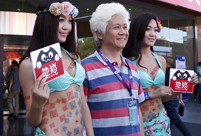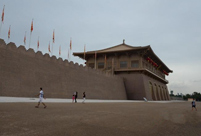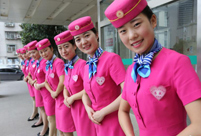 In pics: YOG prism
In pics: YOG prism
 Amputee girl reaches top of half-left tower in Jiangxi
Amputee girl reaches top of half-left tower in Jiangxi
 Yardangs in Lop Nur
Yardangs in Lop Nur
 Intoxicating Ayding Lake in Xinjiang
Intoxicating Ayding Lake in Xinjiang
 Beijing's MJ impersonator a 'thriller' for crowds
Beijing's MJ impersonator a 'thriller' for crowds
 Armed police compete on the plateau
Armed police compete on the plateau
 Rubber Duck settles in Guiyang new urban area
Rubber Duck settles in Guiyang new urban area
 Rare set of giant panda triplets turn one month old
Rare set of giant panda triplets turn one month old
 Closing ceremony of Youth Olympic Games
Closing ceremony of Youth Olympic Games
 Attractive posters to welcome freshmen
Attractive posters to welcome freshmen
GUANGZHOU, Aug. 29 -- Chinese novelist Mai Jia has a very tight schedule during the summer vacation. With several book fairs staged in rapid sequence across China's top tier cities, he's at the top of their guest lists.
Mai's 2002 debut novel Decoded has been translated into English and will be published in Britain and the United States in spring. He's also the first contemporary Chinese writer whose work has been labeled a Penguin Classics.
After Mo Yan, the Nobel Laureate of Literature, Mai is now considered one of a handful of authors with "overseas success." However, he admits Chinese writers are still marginalized in the West.
"Chinese literature has little influence outside of its border," Mai told Xinhua during the South China Book Festival in mid-August. "Many works have been published abroad, but they hardly reach the common readers. Instead, they've become samples of China studies. That's all."
Mai's debut novel tells a thrilling story about a genius code breaker. Sinologist Olivia Milburn, who translated the work, randomly came across it at a Shanghai airport in 2010. She found it particularly fascinating as her own grandfather was a cryptographer during the World War II.
Later she introduced her translated work to Penguin Random House in the UK.
Mai said the success of his book was a stroke of luck. "But compared with many other Chinese books, Decoded is actually more understandable to westerners -- spy fiction is a mature genre in the West and a lonely, struggling hero is loved and sympathized everywhere."
In other words, the book sells no politics or sex in the "mysterious" country, but simply a good story that everyone can understand, Mai concluded.
INCREASING APPETITES
Market insiders have said more foreign readers are becoming interested in China.
"The foreign readers have never been more interested in China and we're expecting some excellent young Chinese writers," said David Parrish, sales and marketing director of Random House in East Asia.
He said the Asia-Pacific market will be the ideal start point for Chinese authors, as their culture is increasingly well accepted in the region.
Meanwhile, some have suggested Chinese writers and publishers should better grasp the interest and expectations of foreign readers.
Daniel Watts, publishing consultant and the former Managing Director of Pan Macmillan Asia, used Chinese scholar Yu Dan's book on Confucius as an example.
The non-fiction work "Confucius from heart: Ancient wisdom for today's world" has been published in 29 different languages, with more than 350,000 copies sold outside China.
"Many westerners have heard the name of Confucius, but few of them could understand his original works," explained Watts. "Yu Dan's book presents the Confucianism in a western-reader-friendly format."
Watts also advised Chinese authors to find their own niche markets, instead of all squeezing into the over crowded Anglo-American market.
"Only three percent of the books in the UK and US are translated ones. It's extremely difficult for the foreign language books to succeed there."
Toby Eady, a renowned British literary agent, also believed that "small is beautiful", and pointed out that Chinese writers will gain much more attention and resources from small publishers and small markets than from the big ones.
CHALLENGES AHEAD
Despite the open arms of western publishers and readers, there are still stumbling blocks lying ahead, among which, translation is the most challenging one.
Yu Dan's Confucius book is comparatively short in Chinese non-fictions, with only 60,000 characters. But it took it almost three years to go global.
"My friends asked me why we were that patient," Gu Qing, deputy editor-in-chief of Zhonghua Book Company and Yu Dan's Chinese publisher recalled. "The book is well-written, but its overseas success is owed to the excellent translation."
Chen Jiaxian, chairman of Taiwan's Bardon-Chinese Media Agency, also advised his counterparts in the mainland to slow down and take the long view.
"Some publishers require books to come out in six months. I can't even find the right translator to do a single chapter in such a short time." Chen said, "We should trust each other and have more patience in exploring a new market."
Wu Fan, a bilingual writer living in San Francisco stressed that besides translators, Chinese authors also need help from professional literary agents, which is still a rare occupation in the country.
Wu moved to the US in 1997 for further study at Stanford and later worked in Yahoo. She started writing simply out of interest.
"I knew no writers in the US and without my agent I would never be recognized by the publishing houses or mainstream media," Wu explained. "About 90 percent of the writers in UK and US have their agents, who help them with copyright negotiation and promotion so they can focus on writing."
There are nearly 50 countries in the European market, with over 700 million people speaking dozens of different languages, according to Parrish.
"Facing such a mixed market, the Chinese writers need good agents to help them filter the demands," Parrish added.
 Models with two-dimensional codes painted on bodies
Models with two-dimensional codes painted on bodies Antique exhibition of Maritime Silk Road held in Jinan
Antique exhibition of Maritime Silk Road held in Jinan NASA releases images of solar flare
NASA releases images of solar flare Daming Palace in Chang’an City in photos
Daming Palace in Chang’an City in photos Babies of celebrities born in the year of horse
Babies of celebrities born in the year of horse Farmer Painting, one of Ansai's Three Strange Wonders
Farmer Painting, one of Ansai's Three Strange Wonders Special holidays
Special holidays World's top 10 fighters
World's top 10 fighters 'Stewardesses' serve in hospital
'Stewardesses' serve in hospital The biggest duty-free store of the world
The biggest duty-free store of the world Volunteers bid farewell to YOG
Volunteers bid farewell to YOG More police dogs join anti-terror campaign in Inner Mongolia
More police dogs join anti-terror campaign in Inner Mongolia Picturesque Dayilan Manchu village in NE China
Picturesque Dayilan Manchu village in NE China Athletes experience the charm of Chinese traditional opera in Nanjing
Athletes experience the charm of Chinese traditional opera in Nanjing Contestants for Miss Bikini World experience Chinese traditional culture
Contestants for Miss Bikini World experience Chinese traditional cultureDay|Week|Month